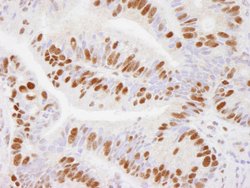Learn More
USP7 Polyclonal Antibody, Bethyl Laboratories
Rabbit Polyclonal Antibody
$151.31 - $568.26
Specifications
| Antigen | USP7 |
|---|---|
| Applications | Immunofluorescence, Immunohistochemistry |
| Classification | Polyclonal |
| Conjugate | Unconjugated |
| Form | Liquid |
| Catalog Number | Mfr. No. | Quantity | Price | Quantity & Availability | |||||
|---|---|---|---|---|---|---|---|---|---|
| Catalog Number | Mfr. No. | Quantity | Price | Quantity & Availability | |||||
50-157-1338

|
Bethyl Laboratories, Inc
IHC00018T |
10 μL |
Each for $151.31
|
|
|||||
50-157-1337

|
Bethyl Laboratories, Inc
IHC00018 |
100 μL |
Each for $568.26
|
|
|||||
Description
The recommended shelf life for this product is 1 year from date of receipt. Based on 100% sequence identity, this antibody is predicted to react with Rat, Pig, Monkey, Northern white-cheeked gibbon and Zebra finch
USP7 or HAUSP is a ubiquitin specific protease or a deubiquitylating enzyme that cleaves ubiquitin from its substrates. Since ubiquitylation (polyubiquitination) is most commonly associated with the stability and degradation of cellular proteins, HAUSP activity generally stabilizes its substrate proteins. HAUSP is most popularly known as a direct antagonist of Mdm2, the E3 ubiquitin ligase for the tumor suppressor protein, p53. Normally, p53 levels are kept low due to Mdm2-mediated ubiquitylation and degradation of p53. Interestingly, in response to oncogenic insults, HAUSP can deubiquitinate p53 and protect p53 from Mdm2-mediated degradation, indicating that it may possess a tumor suppressor function for the immediate stabilization of p53 in response to stress. Another important role of HAUSP function involves the oncogenic stabilization of p53. Oncogenes such as Myc and E1A are thought to activate p53 through a p19 alternative reading frame (p19ARF, also called ARF)-dependent pathway, although some evidence suggests ARF is not essential in this process. An intriguing possibility is that HAUSP provides an alternative pathway for safeguarding the cell against oncogenic insults.Specifications
| USP7 | |
| Polyclonal | |
| Liquid | |
| RUO | |
| TBS with 0.1% BSA and 0.09% sodium azide | |
| HAUSP | |
| Between 1 and 50 | |
| Primary | |
| 4° C | |
| USP7 |
| Immunofluorescence, Immunohistochemistry | |
| Unconjugated | |
| Rabbit | |
| Human, Mouse | |
| Q6A4J8, Q93009 | |
| 252870, 7874 | |
| IgG | |
| Antigen affinity chromatography | |
| Antibody |
The Fisher Scientific Encompass Program offers items which are not part of our distribution portfolio. These products typically do not have pictures or detailed descriptions. However, we are committed to improving your shopping experience. Please use the form below to provide feedback related to the content on this product.
